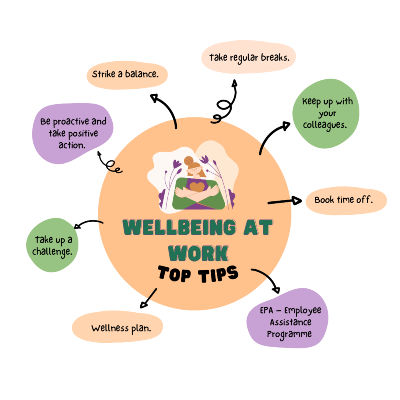Your wellness
Understand and discover steps on how to look after your physical and mental health wellbeing.
Warwickshire County Council has a plethora of resources to help you create positive habits to add to your daily life or access the range of health support services across Warwickshire.
On our Wellness sites you will find advice on the cost of living, looking after your physical and mental health, smoking, loneliness, support available for families and much more.
- Mind UK has also explored what mental wellbeing is and how to take care of it depending on the context.
Amongst many other resources you can find tips for improving your mental wellbeing or steps to explore 5 ways to wellbeing at work.
- Mental Health at work website offers plenty of tools, resources, and stories, Mental Health at Work makes navigating the workplace mental health landscape easy.
Check out our top tips for you on how to take care of your wellbeing at work!

- Be proactive and take positive action.
Be proactive and take personal responsibility and practical steps to look after your own health and wellbeing. Do not focus your attention only on the negative things that happen in your life. Our mental health is not only affected when we feel down, burned out or stressed, it is also affected by the positive experiences and actions that we take, like developing heathy habits, spending time with the people that care about us or doing work we enjoy.
Therefore, when you take a holistic approach, and whilst addressing any negative aspects of your mental health you also focus on taking positive action, you will be able to take care of your mental health in a sustainable manner.
- Strike a balance.
Work-life balance is important. Although, you may need to respond to business needs and work harder and longer for certain periods of time, try to make it an exception, not the norm. If you struggle with your workload, try to reprioritise it, focus on what is important and what needs to get done first. There are also many tools that will help you manage your time such as calendars, to-do list, notebooks etc.
If you have tried all of the above and you still feel your workload is spiralling out of control, then talk to your manager/supervisor. Make sure that together you review your workload, make your goals and deadlines realistic, as well as suggest organisational development to avoid such issues from arising again. However, if that does not yield any results, consider taking it to higher manager or a HR advisor (if there is one in your company) or another member of staff that you think could help.
- Take regular breaks.
Do not stay sat at your desk or stare at your screen for too long. Make sure you take regular breaks. Having a break can make you feel more productive and energised when you come back, so make a drink, grab a snack or have a stretch regularly.
Introduce some exercises into your daily routine. The NHS has an array of resources dedicated to different exercises and their benefits.
- Keep up with your colleagues.
Regular interaction with others is good for wellbeing. Check in regularly with your colleagues, set up catch ups and social events whether online or in person and try to get to know them a bit better. After all, teamwork makes the dreamwork and you cannot have a great team without understanding each other’s perspective.
- Book time off.
It might be difficult to book time off for your mental health when workload and deadlines are looming. However, it is imperative that you block away that time for yourself, for you to have a break, recover and be ready for more challenges. It may not seem beneficial in the moment, but your future self will thank you.
- Take up a challenge.
Personal development is important to make you more resilient, confident and effective in your role. Taking up challenges and learning and developing your skills positively affects your mental health and makes your work more purposeful.
It does not necessarily have to be an advancement in your career, it can be simply working on yourself and growing as a person by taking up a new hoppy, signing up to a charity event or learning a new language. Personal development is all about setting yourself objectives and taking steps to achieve them, which in turn brings the feeling of progress and self-fulfilment.
- Wellness plan.
A wellness plan is a great tool that will help you and your manager and/or collages understand and be aware of the things that keep us healthy, focused and productive at work and what does the exact opposite. The plan can be shared between you and your manager, and if you wish - with your colleagues. You may also want to consider creating a Team Wellness Plan.
Mental Health UK has resources and examples on what to include and how to use your wellness plan.
- EPA – Employee Assistance Programme
If your organisation has one, familiarise yourself with the Employee Assistance Programme, which offers staff access to information, support and guidance (including coaching and counselling where appropriate) on a wide range of topics including work/career, relationship/family, money management and debt and health and wellbeing.



